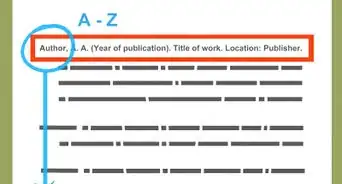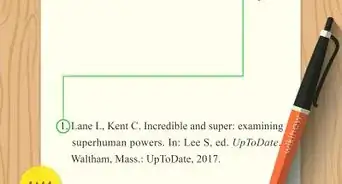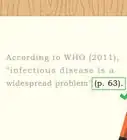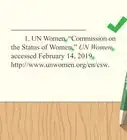This article was co-authored by wikiHow Staff. Our trained team of editors and researchers validate articles for accuracy and comprehensiveness. wikiHow's Content Management Team carefully monitors the work from our editorial staff to ensure that each article is backed by trusted research and meets our high quality standards.
This article has been viewed 15,661 times.
Learn more...
The acknowledgements section of your thesis provides you with an opportunity to thank anyone who supported you during the research and writing process. Before writing your acknowledgements, it's helpful to first choose who exactly you want to include. Then, you can construct your acknowledgements using the right tone and language to properly thank those who contributed to and supported your work in both academic and personal ways.
Steps
Choosing Who to Thank
-
1Include your primary academic advisors and financial supporters. When choosing who to thank in your thesis acknowledgements, the first people you should include are your academic advisors, as well as any people or institutions that helped fund your research. Even if your advisor(s) and funder(s) weren't particularly helpful or involved, it's important that you acknowledge them because without them, your research and thesis likely wouldn't have happened.[1]
- If you choose not to include funders or advisors in your acknowledgements, you could risk insulting them. This could prevent them from working with you in the future, and could even lead them to refuse to write you any letters of recommendation.
- In many cases, you'll have 1 academic advisor who is the chair of your thesis review committee, and then 2 or 3 additional faculty members who serve as secondary co-advisors. If this is the case, make sure that you include your secondary co-advisors in addition to your chair.
-
2Make a list of other professional contacts who contributed to your work. Before you begin writing your acknowledgments, it can be helpful to take some time to write a list of all the professional contacts who have been linked to your thesis in any way. While you'll likely remember to include your advisors and primary funders, it's easy to forget to acknowledge people who have been helpful and supportive but perhaps less directly involved.[2]
- This could be other faculty members, fellow students, research assistants, archivists, librarians, or other institutional personnel who assisted in the research and writing process in any way.
- Professional contributors could include people who read and reviewed your work, helped facilitate research, or talked through challenging concepts and ideas with you throughout the thesis-writing process.
Advertisement -
3Include family and friends who were active supporters. The challenges of completing a thesis often extend into other areas of your life beyond those directly linked to academia. Therefore, you may have had family members and friends who provided crucial support throughout the process, either financially or emotionally. While you should certainly take time to acknowledge such family and friends, make sure that you focus on those who actively supported your endeavor.[3]
- For example, while you may be close with and enjoy seeing a particular cousin or childhood friend, if they weren't actively supporting you during this time, you likely won't have space to include them in your acknowledgements.
-
4Mention well-known professionals in your field wherever relevant. If an accomplished academic in your field read, commented on, or discussed your work with you, make sure that you mention them briefly in your acknowledgements. This will let them know that you appreciate their valuable time and will also help strengthen the authority of your own work to those in your field.[4]
- If a well-known academic in your field was particularly inspirational but did not read your work, you can also mention them in your acknowledgements if you have space to do so.
-
5Acknowledge a higher power if your faith was central to your success. If you're actively religious, you can include an acknowledgment to the higher power you believe in if you feel your faith had a profound impact on your ability to complete your thesis. Try to keep this brief, however, so that you'll have space to thank the many other people involved.[5]
- If your faith is particularly important to you, you could also consider dedicating your thesis to the higher power you believe in. This could be done within the acknowledgments, or on a separate dedication page depending on your institution's formatting preferences.
-
6Focus on acknowledging those who directly impacted your work. When choosing who to include, as a rule of thumb, really focus on the people and institutions who impacted your work in the most tangible and direct ways. While your high school teachers may have influenced your career path, for example, you don't need to include them in the acknowledgements for this academic work.[6]
- If someone was a great influence in your life but didn't contribute to your thesis directly, you could consider writing them a personal letter or email instead of including them in your acknowledgements.
Constructing Your Acknowledgements
-
1Limit your acknowledgements section to 1 double-spaced page or less. By keeping your acknowledgements brief and concise, you'll avoid dragging on and losing your reader's attention.[7] Limiting your acknowledgements to less than 1 page will also make your heartfelt thanks more meaningful for those included, since you'll only have room to thank those who genuinely helped you achieve your goals.
- While acknowledgment sections are generally less than 1 page, some institutions will allow you to write more. Check with your academic advisor to find out for sure.[8]
-
2Place your professional acknowledgements first. While there is no set rule, it can be a good idea to thank your professional and academic acknowledgements first so that the institutions, faculty, and other professional personnel know that you wouldn't have been able to complete your thesis without their support.[9] By making it clear to them how much you appreciate their time and energy spent helping you, they'll also be more likely to want to help you with future projects, or help you find a job after graduation.
- While there's no set rule about acknowledgement order, in general, funders are thanked first for their financial support, then academic supervisors, followed by other academics and professionals, as well as colleagues and classmates.
-
3Thank your family and friends last. Even if you feel like your family and friends were crucial to the successful completion of your thesis, it's customary to leave your personal acknowledgements to the end of the section. Even though the acknowledgements can be written in a more casual tone, they are still part of your thesis and therefore, are part of an academic work. As a result, try to keep it professional by thanking your family and friends after your professional acknowledgements are complete.[10]
- If you're afraid that your personal supporters might be offended by being acknowledged last, you could explain to them that this is a professional courtesy.
-
4Expand on how your biggest supporters helped you. To keep your acknowledgements brief and concise, you'll likely acknowledge most people with a simple “Thank you.” However, for those who contributed to your work the most and provided the most support, use a sentence or two to outline how they helped you. This will be more meaningful for the people who spent more time, energy, and even money to help you complete your thesis.[11]
- Since your academic advisor was likely a big part of your research and writing process, you'll likely want to expand on how they helped you. For example, you could write, “I would like to thank my advisor, Dr. Timothy Kelly, for his guidance and prompt feedback throughout this process.”
-
5Use full names and titles for professional acknowledgements. Even if you usually refer to any of the professional acquaintances included in your acknowledgements in a more casual manner, make sure that you include each person's full name and title as a professional courtesy. Unless someone has told you that they’d like to remain anonymous, using their full name and title recognizes their position and shows that you respect the contributions they've made to your work, the field, or relevant institution.[12]
- In contrast, you can include only first names for your personal acknowledgements if you choose.
-
6Use the same font size and type as the rest of your thesis. Although your acknowledgements will likely be written in a more casual tone with more familiar language, they are still part of your thesis and should thus be written in the same font size and type as the rest of your work. This will give your thesis a sense of continuity throughout the entire work.[13]
Using the Right Tone and Language
-
1Focus on others’ contributions rather than your own accomplishments. When writing your acknowledgements, it's important that you focus on the ways in which others have helped your project rather than on your own accomplishments. While finishing your thesis is quite a feat and you should certainly be proud of yourself, you don't want to distract from the gratitude you feel by focusing on yourself.[14]
- If you focus on your own accomplishments too much, you could risk coming off as a bit smug. Instead, let the quality of your work speak for itself and use the acknowledgements to focus on others.
-
2Use relatively formal language to thank professional contributors. Unlike the more academic-focused portions of your thesis, acknowledgements are often written in first person and tend to be less academic in tone. When thanking those who contributed to your work in a professional manner, however, the language you use should still maintain a sense of professionalism. Therefore, try to choose words and terms that are more formal than you may use in conversation or in a private, personal letter.[15]
- This is particularly important to keep in mind when you thank your academic peers or faculty members that you've developed a personal relationship with, as it can be tempting to write too casually in these instances.[16]
- For example, to thank your advisor, you could write, “I could not have completed this work without the unwavering support of my chair, Dr. Sherre McWhorter. Dr. McWhorter, your patience and guidance made this work possible.”
-
3Thank your family and friends with slightly more personal language. When writing your personal acknowledgements at the end of the acknowledgements page, feel free to use more familiar, casual language. While you want to keep these somewhat professional in tone since this is an academic work, it's generally acceptable to use language that shows a bit more of your individual personality and that speaks to the nature of your personal relationships.[17]
- If your parents provided substantial support for you during this process, thank them in a personal manner by saying something like, “It is impossible to extend enough thanks to my family, especially my parents, who gave me the encouragement I needed throughout this process.”
- Instead of naming each of your friends individually, you could try thanking them collectively in a more casual manner. For example, you could write, “To my friends, this would have been a much more difficult feat without you. Thank you all for your unwavering support and for reminding me to take breaks and have fun when I’ve been stressed out.”
-
4Avoid overly strong emotive language throughout. While you want your acknowledgements to be heartfelt and sincere, try to avoid any language that is overly emotional or personal. This is, after all, an academic piece, so it's important that maintain a sense of professionalism even in the acknowledgements.[18]
- If you want to thank someone for their support in a more emotional, personal manner, try thanking them in person or with a handwritten letter.
References
- ↑ https://www.scribbr.com/dissertation/acknowledgements/
- ↑ https://www.phdstudent.com/Writing-Tips/writing-acknowledgements-your-personal-gratitude
- ↑ https://www.phdstudent.com/Writing-Tips/writing-acknowledgements-your-personal-gratitude
- ↑ https://www.scribbr.com/dissertation/acknowledgements/
- ↑ https://www.scribbr.com/dissertation/acknowledgements/
- ↑ https://www.scribbr.com/dissertation/acknowledgements/
- ↑ https://www.scribbr.com/dissertation/acknowledgements/
- ↑ Jeremiah Kaplan. Research & Training Specialist. Expert Interview. 2 September 2021.
- ↑ https://www.scribbr.com/dissertation/acknowledgements/
- ↑ https://elc.polyu.edu.hk/FYP/html/ack.htm
- ↑ https://www.scribbr.com/dissertation/acknowledgements/
- ↑ https://www.scribbr.com/dissertation/acknowledgements/
- ↑ https://www.phdstudent.com/Writing-Tips/writing-acknowledgements-your-personal-gratitude
- ↑ https://www.phdstudent.com/Writing-Tips/writing-acknowledgements-your-personal-gratitude
- ↑ https://www.scribbr.com/dissertation/acknowledgements/
- ↑ https://elc.polyu.edu.hk/FYP/html/ack.htm
- ↑ https://www.scribbr.com/dissertation/acknowledgements/
- ↑ https://elc.polyu.edu.hk/FYP/html/ack.htm
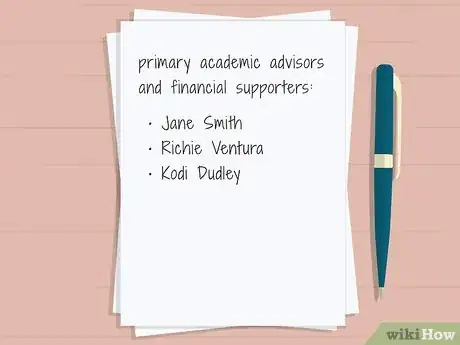
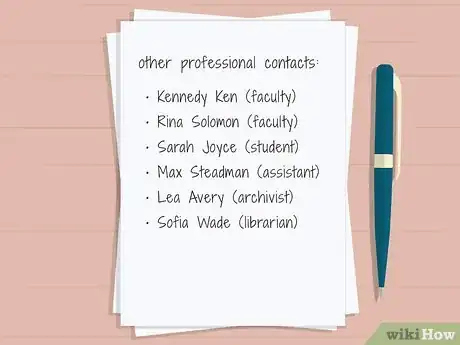
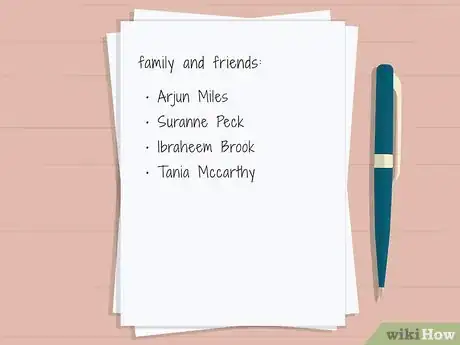
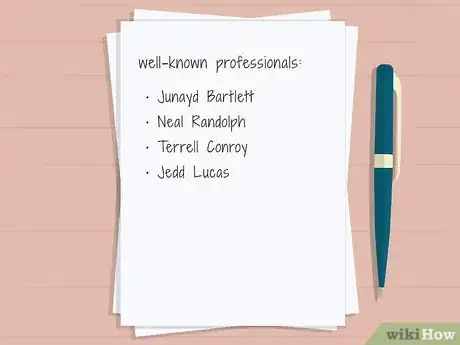
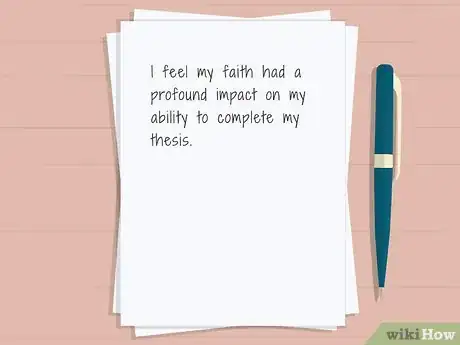
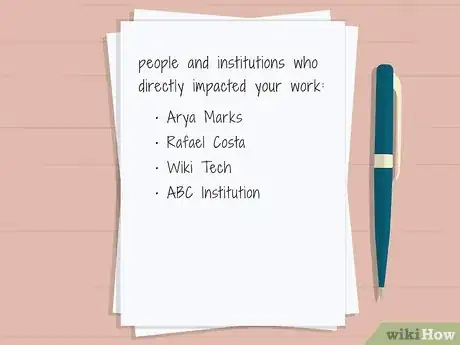
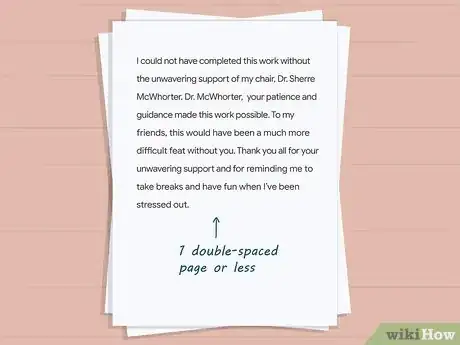

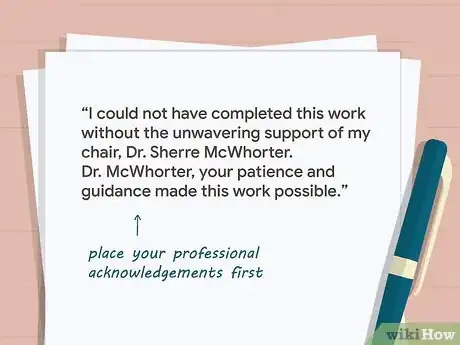
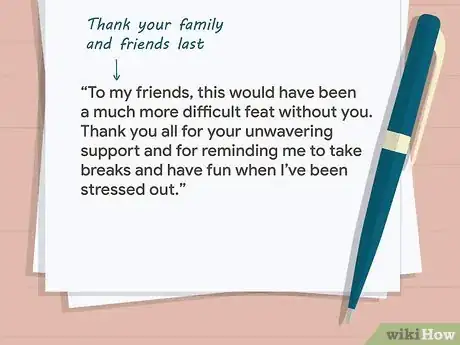
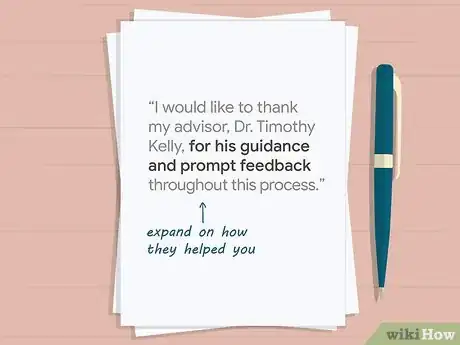
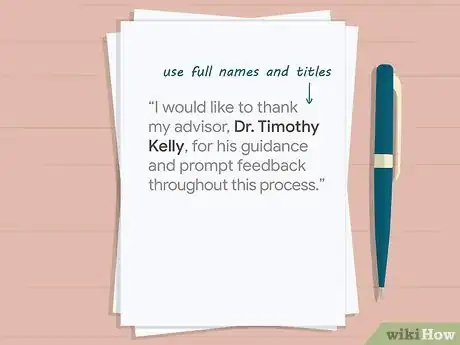
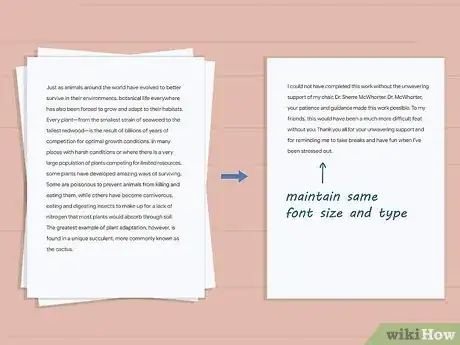
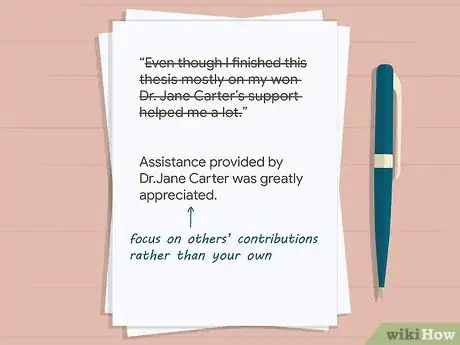
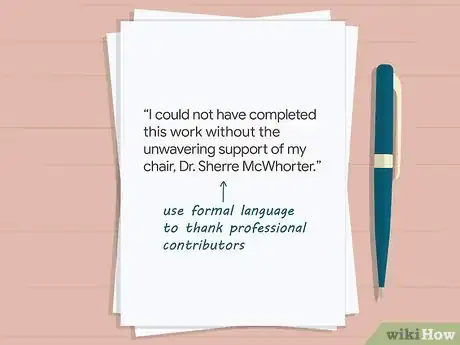
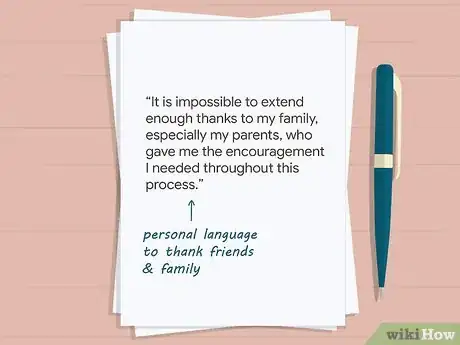
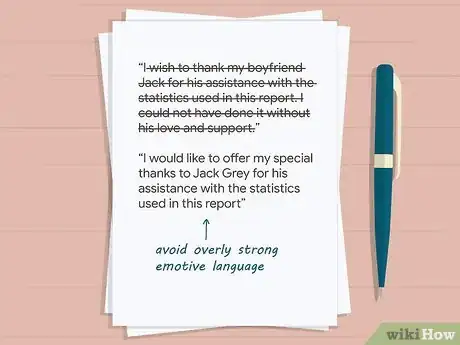
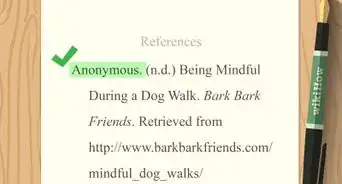
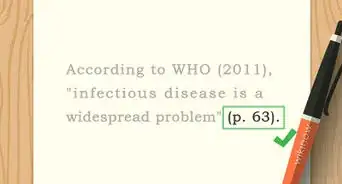
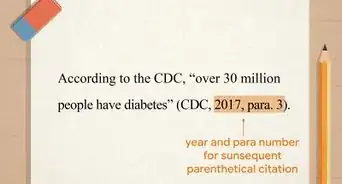
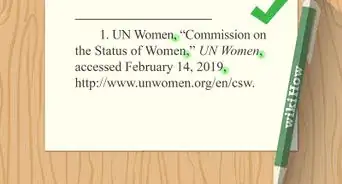
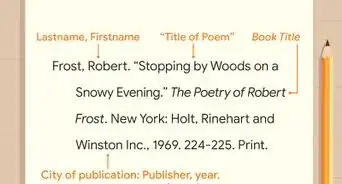

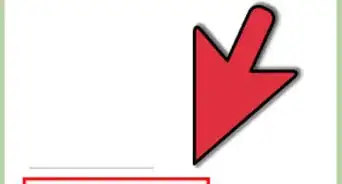
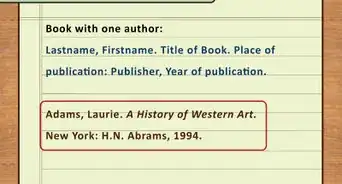

-Step-18.webp)

